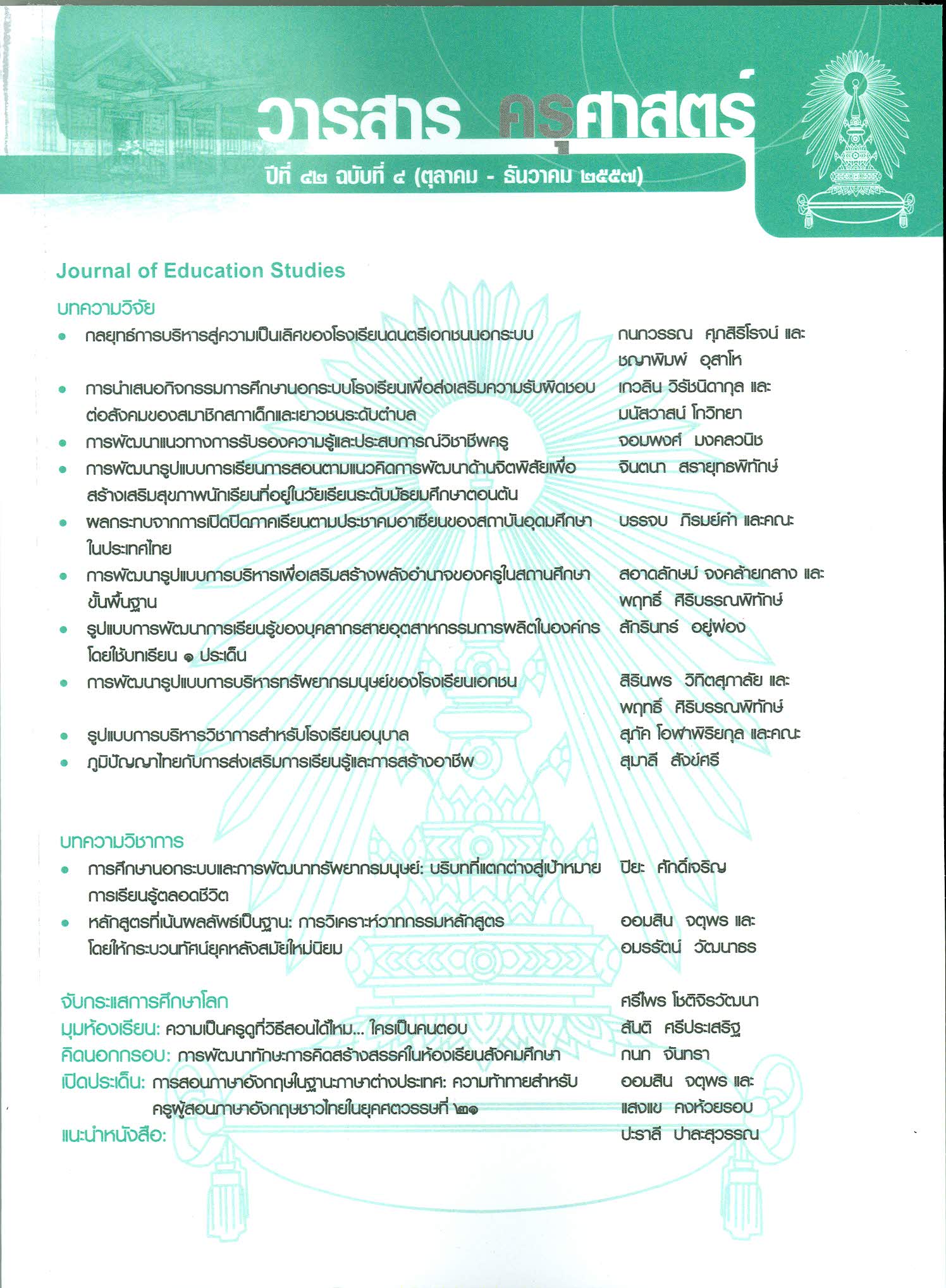การนำเสนอกิจกรรมการศึกษานอกระบบโรงเรียนเพื่อส่งเสริมความรับผิดชอบต่อสังคม ของสมาชิกสภาเด็กและเยาวชนระดับตำบล A PROPOSED ACTIVITY OF NON-FORMAL EDUCATION TO ENHANCE SOCIAL RESPONSIBILITY OF LOCAL CHILDREN AND YOUTH COUNCIL MEMBERS
Keywords:
กิจกรรมการศึกษานอกระบบโรงเรียน, ความรับผิดชอบต่อสังคม, สภาเด็กและเยาวชนระดับตำบล, NON-FORMAL EDUCATION ACTIVITY, SOCIAL RESPONSIBILITY, LOCAL CHILDREN AND YOUTH COUNCILAbstract
การวิจัยในครั้งนี้มีวัตถุประสงค์ เพื่อ 1) พัฒนากิจกรรมการศึกษานอกระบบโรงเรียนตามแนวคิดการเรียนรู้แบบมีส่วนร่วมที่ส่งผลต่อการส่งเสริมความรับผิดชอบต่อสังคมของสมาชิกสภาเด็กและเยาวชนระดับตำบล 2) เพื่อเสนอแนวทางการจัดกิจกรรมการศึกษานอกระบบโรงเรียนเพื่อส่งเสริมความรับผิดชอบต่อสังคมของสมาชิกสภาเด็กและเยาวชนระดับตำบลสู่ชุมชน กลุ่มทดลองในครั้งนี้ คือ สมาชิกสภาเด็กและเยาวชนตำบลพระปฐมเจดีย์ อ.เมือง จ.นครปฐม จำนวน 30 คน และกลุ่มผู้เชี่ยวชาญทางการจัดกิจกรรมการศึกษานอกระบบโรงเรียนเพื่อส่งเสริมความรับผิดชอบต่อสังคมของสมาชิกสภาเด็กและเยาวชน จำนวน 12 คน
ผลการวิจัยพบว่า 1) กิจกรรมที่ช่วยส่งเสริมความรับผิดชอบต่อสังคมของสมาชิกสภาเด็กและเยาวชนตำบลดำเนินการตามแนวคิดการเรียนรู้แบบมีส่วนร่วม โดยมีเนื้อหาครอบคลุม 11 ด้าน คือ 1. ความรู้เรื่องบทบาทและหน้าที่ของสมาชิกสภาเด็กและเยาวชนตำบล 2. ภาวะผู้นำ 3. การสื่อสาร 4. คุณธรรมจริยธรรมที่พึงประสงค์ 5. มารยาทในที่ประชุม 6. การศึกษาชุมชน 7. แผนที่เดินดิน 8. การจัดการความรู้ 9. การเขียนโครงการ 10. การติดต่อประสานงาน และ11. การประชาสัมพันธ์ โดยหลังการทดลอง พบว่ากลุ่มทดลองมีค่าเฉลี่ยความรู้ ทักษะ และทัศนคติเรื่องความรับผิดชอบต่อสังคมหลังการทดลองสูงกว่าก่อนการทดลองอย่างมีนัยสำคัญทางสถิติที่ระดับ .05 2) แนวทางในการจัดกิจกรรมการศึกษานอกระบบโรงเรียนเพื่อส่งเสริมความรับผิดชอบต่อสังคมของสมาชิกสภาเด็กและเยาวชนระดับตำบลสามารถมีเนื้อหาออกเป็น 6 ด้าน ได้แก่ 1. ด้านแผนกิจกรรม โดยควรมีการสำรวจความต้องการของผู้เรียนก่อนการจัดกิจกรรม 2. ด้านผู้เรียน ต้องเป็นผู้ที่เข้าร่วมกิจกรรมด้วยความสมัครใจและมีอายุตั้งแต่ 15 ปีขึ้นไป 3. ด้านผู้สอน ต้องเป็นผู้อำนวยการเรียนรู้ที่ดี รู้จักการตั้งคำถามเพื่อให้ผู้เรียนได้แสดงความคิดเห็น 4. ด้านการจัดกิจกรรม รูปแบบกิจกรรมสามารถจัดได้อย่างหลากหลายตามความต้องการของผู้เรียน 5. ด้านสื่อการเรียนการสอน เน้นการใช้สื่อภายในท้องถิ่น สามารถปรับเปลี่ยนได้ตามความเหมาะสม 6. ด้านสถานที่ที่ใช้จัดกิจกรรม เป็นสถานที่ที่ก่อให้เกิดสมาธิในการเรียนรู้
The purposes of this research were: 1) to develop the activities of non-formal education to enhance the social responsibility of local children and youth council members, 2) to propose the guideline for organizing the non-formal education activity to enhance the social responsibility of local children and youth council members. The research was an experimental research. The research sample group consisted of 30 local children and youth members in Tambon Phrapathom Chedi, Amphur Muang, Nakhonpathom and 12 experts in the activity development of non-formal education.
The findings indicated that 1) the activities that enhance the social responsibility of local children and youth council members consisted of 11 aspects; (1) the knowledge on roles and functions of the local children and youth council member, (2) leadership (3) communication skills (4) moral and ethics (5) meeting-moral (6) community study (7) wailkingmap (8) knowledge management (9) project planning (10) coordination (11) public relations. After the experimental activity, it was found that the experimental group had higher mean scores in knowledge, skills and attitude in social responsibility than before the experiment significantly at .05 level. 2) The guideline for organizing the non-formal education activities to enhancing the social responsibility of local children and youth council members consisted of 6 aspects; 1) for activity plan, learner’s need before the activity should be surveyed; 2) learners must willingly participate the activity and they must be over 15 years old; 3) lecturers must provide the well learning, know how to question to learners for showing the opinion; 4) for organizing activities, it can be organized in varieties depending on learners’ need 5) teaching materials emphasized to be used in the local and can be adapted suitable and 6) place organizing activities must cause the concentration of learning.




